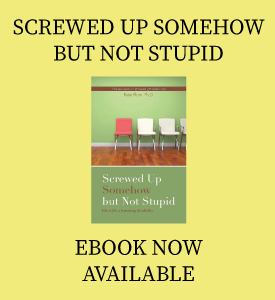This is something I wrote in a writing class.
No one showed you how to do lots of things you can do. You got shown how to add and multiply and (probably) got shown how to read and write. You got shown how to play any instruments or sports you play. But no one showed you how to be a friend, have a conversation, look at a face, figure out what clothes to wear…. Oh, sure, you saw, but you probably didn’t get shown. Not the way you got shown those other things.
What if you couldn’t learn to do things without being shown? What if you skipped on everything everyone else learned by some seeming osmosis? What would that be like?
You might be startled at all the things you learned by looking without being shown; newborn babies can’t do all that much (eat, pee, sleep, cry and be very, very cute) and, if you can do it and a newborn baby can’t, you learned it somehow, somewhere but maybe not from somewho. And, if you learned it, someone else might not learn it. Someone who could learn other things might not be able to learn what you learned. If it’s reading, we call it dyslexia. If it’s math, we call it dyscalculia. If it’s the things no one showed anyone then it might be what’s called nonverbal learning disabilities, which you might not have heard of because no one showed you. Until now.



Is this your new book ?
nice and true
I’d love to read more, maybe specific examples and how they are overcome. It’s hard for teachers to discern problems with things that are not spoken, written, acted out. Something that is just not there
that the world takes for granted.
Hi Mary – Thanks for your comment. I am adding stuff to my post. I also have a lot of examples in my book.
Hmm. I don’t seem to be able to edit it. I mean things like how close to stand to people, how loud to talk, how to hold a conversation, how to take turns, how to vary your language by situation and so on.
Excellent.
It’s interesting to learn about learning disabilities because one’s explicit strategies for learning seemingly evident stuff is very good information to everyone, not just people with learning disabilities.
I often felt I had being asked to learn something, a poem say, and had never been told how to learn it. Just learn it just does not work ! – Just as just teach it won’t work. What works for both of us is more interesting. Teaching -> Learning.
Wow :(((( . i’m 20 right now and i used to think myself stupid until i know about LD last year… Thank you very much…